The "Cheese Shop" is a sketch from Monty Python's Flying Circus.
"Bruces' Philosophers Song", also known as "The Bruces' Song", is a Monty Python song written and composed by Eric Idle that was a feature of the group's stage appearances and its recordings.

Neil James Innes was an English writer, comedian and musician. He first came to prominence in the comedy rock group the Bonzo Dog Doo-Dah Band and later became a frequent collaborator with the Monty Python troupe on their BBC television series and films, and is often called the "seventh Python" along with performer Carol Cleveland. He co-created the Rutles, a Beatles parody/pastiche project, with Python Eric Idle, and wrote the band's songs. He also wrote and voiced the 1980s ITV children's cartoon adventures of The Raggy Dolls.
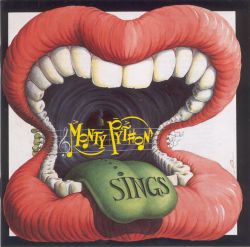
Monty Python Sings is a compilation album of songs by English comedy troupe Monty Python. Released in 1989 to celebrate their 20th anniversary, it contains popular songs from their previous albums and films. The album was dedicated to the memory of founding member Graham Chapman, who died two months before its release.
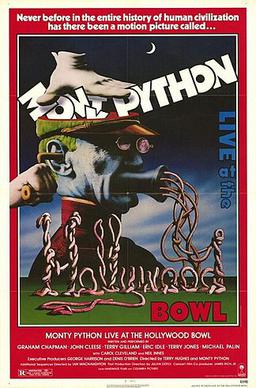
Monty Python Live at the Hollywood Bowl is a 1982 concert comedy film directed by Terry Hughes and starring the Monty Python comedy troupe as they perform many of their sketches at the Hollywood Bowl. The film also features Carol Cleveland in numerous supporting roles and Neil Innes performing songs. Also present for the shows and participating as an 'extra' was Python superfan Kim "Howard" Johnson.
George "Porky" Peckham is an English record engineer, widely recognised as among the most accomplished in the business. He has been responsible for producing the master discs from which many vinyl records have been pressed over the last 40 years.

The Bruces sketch is a comedy sketch that originally appeared in a 1970 episode of the television show Monty Python's Flying Circus, episode 22, "How to Recognise Different Parts of the Body", and was subsequently performed on audio recordings and live on many occasions by the Monty Python team.

The Monty Python Instant Record Collection is the title of two compilation albums by the Monty Python troupe. The first was released in the UK and Canada in 1977 and drew from the group's first three studio albums, first live album, and first soundtrack album on the Charisma label, while the second was released in the US in 1981 and comprised tracks from their four albums released on the Arista label. Billed as "the pick of the best of some recently repeated Python hits again, Vol. II", the record sleeve was designed by Terry Gilliam. The UK/Canadian version originally featured packaging that folded out into a cardboard box resembling a large stack of record albums. An inner sleeve featured a spoof "Where Are They Now?" update on the members of the Python team.

Monty Python's Previous Record is the third album by Monty Python. Released in 1972, it marked the group's first collaborations with regular sound engineer Andre Jacquemin as well as musician Neil Innes, who had previously appeared with future members of the Python team on Do Not Adjust Your Set. The album contains many sketches from the third series of Flying Circus, one from the second as well as an abridged version of "The Tale of Happy Valley" from the second German show. The album was released midway through the broadcast of Series 3, whose sketches featured on the album were all from its first half, with the exception of "Dennis Moore" which aired a month later and therefore made its debut here. The oldest sketch on the album, Eric Idle's "Radio Quiz Game", dates back to I'm Sorry, I'll Read That Again, where it was performed by Graeme Garden – Idle having subsequently performed the sketch himself on two editions of Do Not Adjust Your Set. The rest of the material was specially written for the album.
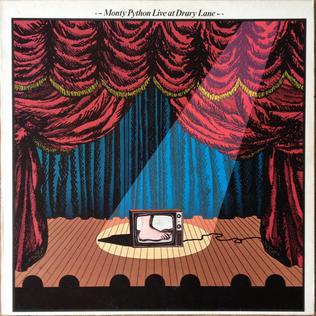
Monty Python Live at Drury Lane is a live album released by Monty Python in 1974. It was recorded on the final night of their four-week run at the Drury Lane Theatre in London earlier that year and edited onto disc with new studio linking material by Eric Idle and Michael Palin. The majority of the sketches are from Flying Circus and vary slightly from their television counterparts, although "Cocktail Bar" was written for the third series but not used. The team also revived sketches from At Last The 1948 Show, including "Secret Service", "Wrestling" and "Four Yorkshiremen" - the latter on its way to being adopted as a Python standard. Neil Innes provided the musical interludes, while Eric Idle's then wife Lyn Ashley replaced regular Python actress Carol Cleveland in supporting roles.

The Album of the Soundtrack of the Trailer of the Film of Monty Python and the Holy Grail is the first film soundtrack album by Monty Python, released in 1975. It features selected scenes from Monty Python and the Holy Grail interspersed with a large volume of new studio material, much of which centers on a spoof screening of the film at the Classic Silbury Hill Theatre. Also among the new items is the "Marilyn Monroe" sketch, which Graham Chapman co-wrote with Douglas Adams – the pair having recently collaborated on the fourth series of Monty Python.

Monty Python Live at City Center is a US-only live album by Monty Python, recorded at the New York City Center in April 1976 and rush released by Arista Records the following month. In order to get the album out in the shops quickly, the recordings were made early on in the run, where some of the performances were affected by faulty microphones. The team were joined onstage by regular actress Carol Cleveland and musician Neil Innes, who also performed in some sketches.
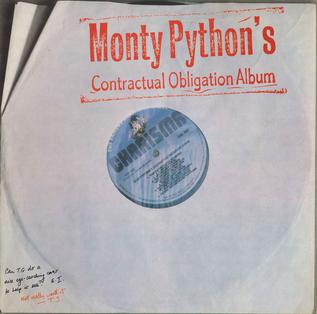
Monty Python's Contractual Obligation Album is the final studio album by Monty Python, released in 1980. As the title suggests, the album was put together to complete a contract with Charisma Records. Besides newly written songs and sketches, the sessions saw re-recordings of material that dated back to the 1960s pre-Python shows I'm Sorry, I'll Read That Again, The Frost Report, At Last The 1948 Show and How To Irritate People. One track, "Bells", dates from the sessions for Monty Python's Previous Record, while further material was adapted from Eric Idle's post-Python series Rutland Weekend Television. The group also reworked material written but discarded from early drafts of Life Of Brian, as well as the initial scripts for what would eventually become The Meaning Of Life.

The Instant Monty Python CD Collection is a box set released in 1994 of six CDs containing eight albums by the Monty Python troupe. It does not include the first Monty Python record, Monty Python's Flying Circus, whose rights are still owned by the BBC.

Hastily Cobbled Together for a Fast Buck is the name of a bootleg of an unreleased album by Monty Python, mostly made up of outtakes from the 1980 sessions for their Contractual Obligation Album. The album was compiled by producer Andre Jacquemin in 1987 but pulled from release in favour of a compilation of previously released material, The Final Rip Off.

Not the Messiah (He's a Very Naughty Boy) is a comedic oratorio based on Monty Python's Life of Brian. It was written by former Monty Python cast member Eric Idle and collaborator John Du Prez, and commissioned by the Luminato festival.

"Brian Song" is the title song from the 1979 film Monty Python's Life of Brian. It was released as a single in the UK on 16 November 1979 as a Double A side with "Always Look on the Bright Side of Life". The song, which charts the growth of the Brian character to manhood, was composed by Andre Jacquemin and Dave Howman with lyrics by Michael Palin. It was performed by sixteen-year-old Sonia Jones with a string and brass accompaniment in the style of a John Barry film theme. It is included on the Monty Python's Life of Brian album and on the CD Monty Python Sings. In 2013 Martin Chilton, the culture editor for The Telegraph website, listed it as one of the five best Monty Python songs.

Monty Python's Total Rubbish is a 2014 boxed set collecting remastered editions of the nine original albums of British comedy troupe Monty Python on nine CDs or ten LPs. It was released on 30 June 2014.

The Fairly Incomplete & Rather Badly Illustrated Monty Python Song Book is a compendium of songs by Monty Python, released in 1994 on the occasion of their 25th anniversary. The book contains the lyrics and musical scores for songs from the group's Flying Circus TV series, albums and films. Also included are "The Ferret Song" and "Rhubarb Tart Song", which originate from I'm Sorry, I'll Read That Again before appearing on At Last The 1948 Show. The musical scores were edited by regular Python collaborator, John Du Prez.
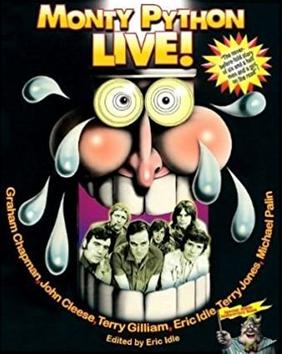
Monty Python Live! is a book detailing the various live performances of the Monty Python team between 1971 and 1980.

















